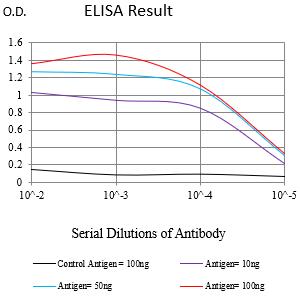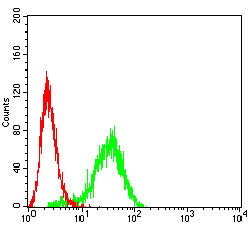

| WB | 咨询技术 | Human,Mouse,Rat |
| IF | 咨询技术 | Human,Mouse,Rat |
| IHC | 咨询技术 | Human,Mouse,Rat |
| ICC | 技术咨询 | Human,Mouse,Rat |
| FCM | 1/200 - 1/400 | Human,Mouse,Rat |
| Elisa | 1/10000 | Human,Mouse,Rat |
| Aliases | Bcl-2; PPP1R50 |
| Entrez GeneID | 596 |
| clone | 3F3F2 |
| WB Predicted band size | 26.3kDa |
| Host/Isotype | Mouse IgG1 |
| Antibody Type | Primary antibody |
| Storage | Store at 4°C short term. Aliquot and store at -20°C long term. Avoid freeze/thaw cycles. |
| Species Reactivity | Human |
| Immunogen | Purified recombinant fragment of human BCL2 (AA: 1-239) expressed in E. Coli. |
| Formulation | Purified antibody in PBS with 0.05% sodium azide |
+ +
以下是关于BCL2抗体的3篇参考文献及其摘要概括:
1. **文献名称**:*BCL2 protein is topographically restricted in tissues characterized by apoptotic cell death*
**作者**:Hockenbery, D., et al.
**摘要**:该研究利用BCL2特异性抗体,首次通过免疫组化技术揭示了BCL2蛋白在正常组织中的分布特征,发现其在线粒体膜上的定位,并证实其在调控细胞凋亡中的关键作用。
2. **文献名称**:*BCL2 gene is frequently expressed in aggressive follicular lymphomas*
**作者**:Tsujimoto, Y., et al.
**摘要**:通过BCL2抗体检测,研究发现滤泡性淋巴瘤中BCL2蛋白因染色体易位(t(14;18))而过度表达,揭示了BCL2在淋巴瘤发生中的致癌机制及作为诊断标志物的潜力。
3. **文献名称**:*BCL2 antibodies for predicting chemotherapy response in breast cancer*
**作者**:Reed, J.C., et al.
**摘要**:文献总结了BCL2抗体在乳腺癌中的临床应用,指出BCL2高表达与激素受体阳性相关,可能作为化疗敏感性和预后的预测指标,为个体化治疗提供依据。
(注:以上文献信息基于经典研究概括,实际引用时建议通过PubMed或学术数据库核实具体细节。)
The BCL2 (B-cell lymphoma 2) antibody is a critical tool for studying the BCL2 protein, a central regulator of programmed cell death (apoptosis). Discovered in 1985 through its association with follicular lymphoma, BCL2 is unique among oncogenes for its anti-apoptotic function. It localizes to mitochondrial membranes and inhibits apoptosis by binding pro-apoptotic proteins like BAX/BAK, maintaining cellular survival. Dysregulation of BCL2. often due to chromosomal translocations (e.g., t(14;18)), is implicated in various cancers, including lymphomas, leukemias, and solid tumors, where its overexpression enables malignant cell resistance to apoptosis.
BCL2 antibodies are widely used in research and diagnostics. In research, they help elucidate apoptotic mechanisms, protein interactions, and tissue-specific expression patterns via techniques like immunohistochemistry (IHC), Western blotting, and flow cytometry. Clinically, BCL2 detection aids in classifying hematologic malignancies and predicting therapeutic responses. Therapeutically, BCL2 has become a drug target, with inhibitors like venetoclax (a BCL2-specific BH3 mimetic) showing efficacy in chronic lymphocytic leukemia (CLL) and acute myeloid leukemia (AML). Antibodies also facilitate pharmacodynamic studies of these inhibitors. Despite its importance, BCL2's role varies across cancer types, requiring context-specific interpretation. Ongoing research continues to refine its clinical utility and explore resistance mechanisms to BCL2-targeted therapies.
×